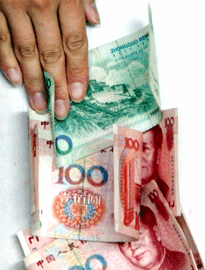The Chinese yuan had its biggest gain against the dollar since last year's
revaluation on speculation that pressure from U.S. President George W. Bush and
strengthening Asian currencies will force China to allow faster gains.

A shopper
hands Chinese money to a cashier in Beijing in this May 27, 2004 file
photo. China scrapped the yuan's peg to the U.S. dollar on July 21, 2005
and it tied it to a basket of currencies, the central bank said, the first
steps in highly anticipated reforms aimed at letting the currency float
freely.[Reuters] |
Bush plans to ask China's President Hu Jintao in a meeting in
Washington Thursday for a more flexible yuan.
Wednesday's rally followed gains in Asian currencies and the euro after the
U.S. Federal Reserve signaled it may soon stop raising interest rates.
China's currency has gained 1.2 percent since July 21, when the yuan was
revalued by 2.1 percent and its peg to the dollar replaced by a managed float
against a basket of currencies including the euro and yen. Surging exports and
investment in manufacturing helped China's economy grow 9.9 percent last year
and contributed to a record $102 billion trade surplus.
"The U.S. will continue to pressure China," said Thio Chin Loo, a currency
strategist at BNP Paribas SA in Singapore. "Given a stronger yen and euro, the
central bank will allow the dollar-yuan to go lower."
The currency climbed 0.1 percent to 8.0158 per dollar as of 1:18 p.m. in
Shanghai, according to data Bloomberg compiled. It rose as much as 0.14 percent,
almost half the 0.3 percent it can gain or fall from a daily mid-rate the
central bank announces.
The swings in the currency added to speculation China will allow wider daily
swings in the yuan. The People's Bank of China may widen the overall daily band
in which it allows the currency to move to as much as 1.5 percent against the
dollar, and the yuan may rally to 7.6 by the end of the year, said Thio at BNP.
"Market Forces"
Cheng Siwei, vice chairman of the Standing Committee of the National People's
Congress, or parliament, called for China to widen the trading band at an
appropriate time, the Hong Kong-based Wen Wei Po newspaper reported on April 4.
Cheng's comments represent his own views, said an official at the central
bank press office, who declined to be named.
U.S. government officials and lawmakers have blamed their country's trade
deficit with China, which has set a record for five straight years, on an
allegedly artificially weak yuan.
Treasury Secretary John Snow Tuesday said China hasn't allowed enough
movement in the currency after President Bush on April 10 said he wanted Hu to
explain at their meeting how he would allow more gains. The dollar fell in Asia
Wednesday against all 16 major currencies that Bloomberg tracks.